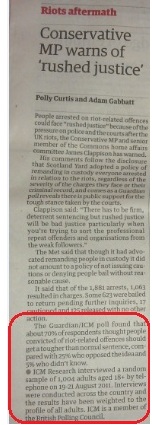Why weren’t ICM’s VI numbers in the Guardian print edition?
Is the paper embarrassed by what its pollster is finding?
 After yesterday’s article looking at what happened the last time pollsters were tested against real election results a PB regular contacted me to say that the latest ICM poll was not covered in the print edition of the Guardian.
After yesterday’s article looking at what happened the last time pollsters were tested against real election results a PB regular contacted me to say that the latest ICM poll was not covered in the print edition of the Guardian.
I found that hard to believe so I’ve just popped into my local public library to go through this week’s print editions of the paper.
I might have missed it and be doing the paper a grave injustice but the only coverage of the poll I could find were two paragraphs (see right) at the bottom of a single column story on page 11 of Wednesday’s edition. There was no reference to the voting intention responses.
What seems to have been with-held from print readers of the Guardian was that for the second month running ICM had the Conservatives on 37% still one point ahead of Labour. The Lib Dems, meanwhile moved up a point to 17%.
My understanding is that there was something of an effort by Labour spinners to dismiss the poll as an outlier and I hope that the Guardian has not succumbed to any pressure.
Outliers are generally caused by sampling error and the fact that that the poll showed almost no change from July suggests that it wasn’t.
There are methodological reasons why ICM comes out the way it does: the views of non-voters from the 2010 general election are heavily discounted even if they say they are certain to vote; a proportion of the “will vote – won’t says” are allocated to the parties they voted for last time and of course, unlike the ubiquitous YouGov surveys, ICM does not use the controversial newspaper weightings.
It’s not unknown for papers not to print the findings of polls they’ve spent thousands of pounds on but I cannot recall the Guardian ever doing it with ICM.
The paper’s long-standing relationship with the most accurate pollster from 1997, 2001, 2010 and the AV referendum is something of which it should be proud.